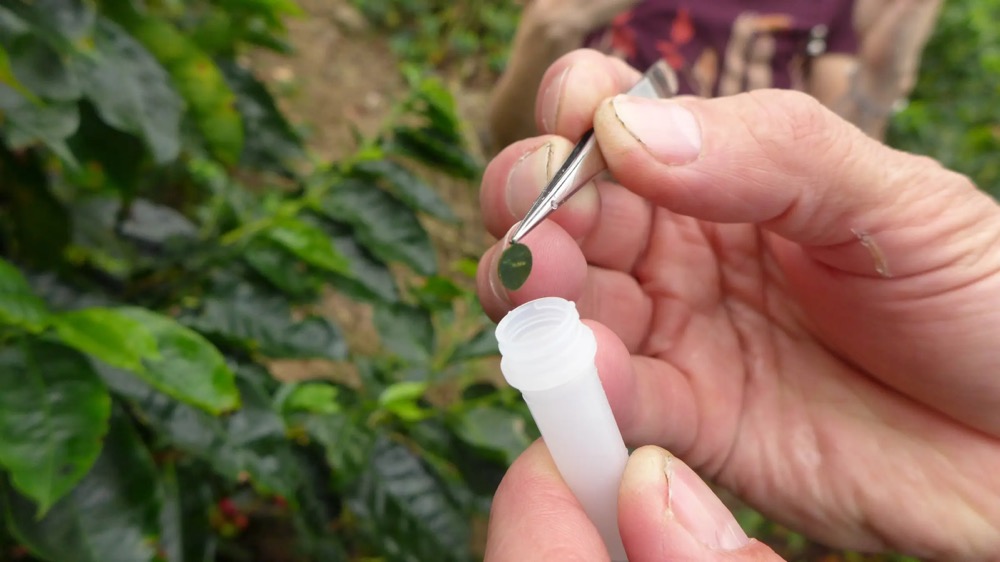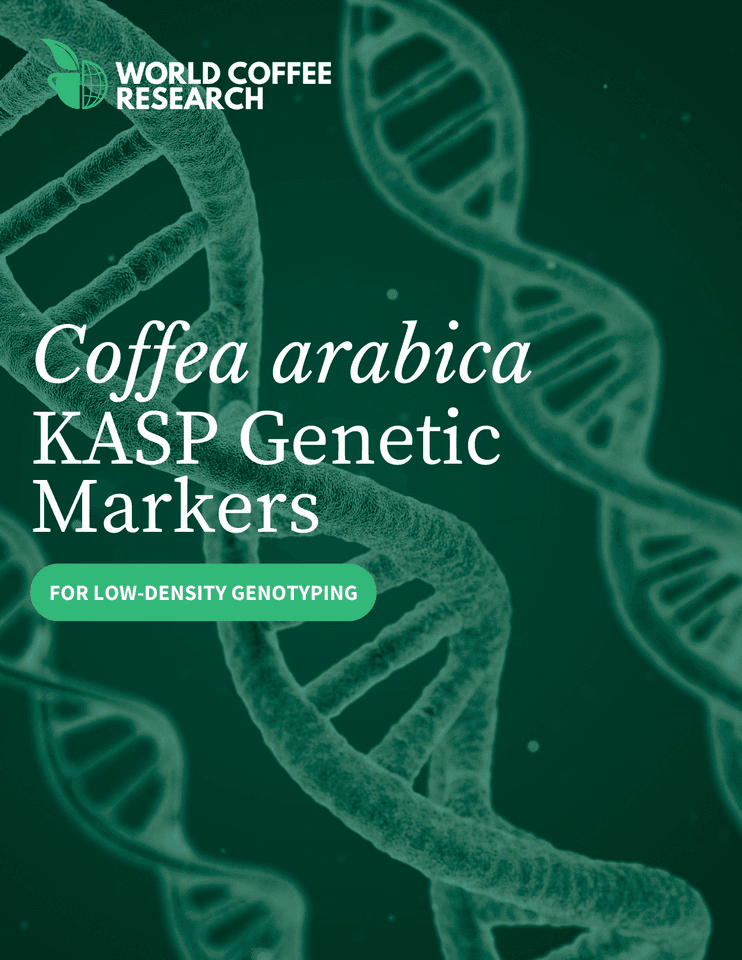
Coffee leaf samples being collected for genetic analysis.
World Coffee Research announced today the release of an arabica coffee genetic fingerprint database that will make variety authentication cheaper and simpler. Verification of coffee varieties is important to ensure quality control of plant material available to farmers worldwide. The organization is making the database openly accessible to the scientific community so that it can be used by public and private labs for variety verification.
“This unique achievement brings new technology to coffee to dramatically reduce quality control costs to ensure the future of coffee agriculture.”
One of the database’s most important applications is the development of low-cost variety authentication to support coffee’s evolving seed sector. Similar tools are used widely in other crops by seed producers, seed traders and food manufacturers but until now, these tools have been too expensive or impractical to use for coffee on a wide scale. Prior studies by WCR have confirmed the need for tools to support better quality control in seed lots and nurseries; a published study found that only 61% of tested trees were genetically conforming (meaning 39% did not conform to the expected genetic profile for that variety). This can have devastating economic consequences for a farmer, if, for example, a supposedly disease-resistant variety turns out to be susceptible to debilitating infections.
“This unique achievement brings new technology to coffee to dramatically reduce quality control costs to ensure the future of coffee agriculture,” says Dr. Jennifer “Vern” Long, CEO of World Coffee Research. “We have tremendous enthusiasm for this new global public good for the coffee sector, and encourage widespread uptake by coffee sector actors involved in planting new trees—from funders to implementers to growers to public institutions.”
Determining the genetic makeup of a plant—the specific variety, otherwise known as its “genotype”—is important at many steps along agricultural supply chains. This database of genetic fingerprints for arabica uses 45 Single Nucleotide Polymorphism (SNP) molecular markers— tiny genetic variations dispersed through a plant’s DNA sequence—to create a unique genetic fingerprint for 23 of the most commonly recognized coffee varieties in commercial coffee production in Latin America. SNP markers are accurate and can be analyzed quickly and at a much lower cost than other genetic markers. The reference database was validated and refined by World Coffee Research using over 30,000 leaf samples from trees in six countries (Guatemala, Honduras, El Salvador, Nicaragua, Costa Rica, and Peru) between 2021 and 2023. The database is a living document: WCR plans to add fingerprints for additional varieties in the coming months and years.
To ensure the coffee community has immediate access to this service, WCR worked with Sweden-based Intertek AgriTech to validate and refine the database and technical protocols so that the markers can be used for high-volume applications (typically, a minimum of 376 samples). Intertek AgriTech is an ISO-certified quality assurance laboratory that provides lab services to the global agricultural sector. Now that WCR is making the database publicly available it may also be used by other providers to develop their own DNA testing services.
As an example of how it works, a coffee seed lot owner might want to check the genetic purity of their trees to ensure they are the correct variety. They collect small pieces of the leaves from trees they want to authenticate and send them to a genotyping lab. DNA is extracted from the leaf samples, and the SNP profile is read. The sample’s SNP fingerprint is then compared against the known SNP fingerprint for the variety in question. When the fingerprints match, the variety can be confirmed.
Collaboration and transparency to ensure higher quality plants for farmers
The database was developed by WCR’s breeding team, led by Drs. Jorge Berny and Santos Barrera (WCR Research Scientists, Plant Breeding & Genomics) building on the marker panel developed by Dr. Dapeng Zhang (Research Geneticist) from USDA ARS. Multiple institutions facilitated access to leaf samples used to create and validate the database, including CATIE, ICAFE, IHCAFE, ANACAFE. The work was funded by WCR member companies and the USDA/FAS MOCCA program.
This public reference panel of SNP-based genetic markers serves as a crucial tool and a leap forward for the coffee industry to authenticate varieties, reducing risk and enhancing value for farmers.
An example of the significant impact such a tool can have on coffee production at scale can be found in El Salvador. El Salvador’s government is undertaking a national renovation plan, with the goal of producing and distributing more than 150 million plants over the next decade as part of its commitment to revitalize the country’s coffee sector. These plants are hoped to generate 1.8-2 million bags (45.6 kg) of exportable green coffee, stimulating the country’s economy and supporting the livelihoods of producers nationwide. This SNP panel is being used to validate the authenticity of the trees it plans to distribute to farmers, in order to ensure they are the high-performing varieties selected to meet the country’s ambitious production goals. WCR is excited to be a partner in this work to sustain supplies of high-quality beans from El Salvador.
To access the SNP database visit, click here. To access genetic testing services, visit Intertek Agritech.










NO COMMENT